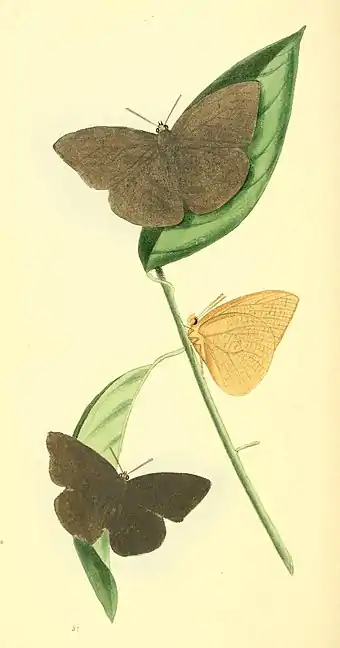Note: the colouring of this plate is quite wrong: the wings should be white.—Uploader.

COLIAS Pyrene.
White African Colias.
Generic Character.—See Pl. 5.
Specific Character.
- C. alis albis; anticis suprà punctulo nigro subcentrali oblongo ad apicem approximante; posticis margine integerrimis; singulis subtùs puncto ocellari lineisque fulvis undulatis: sexibus similibus.
- Wings white; anterior with a small, nearly central, oblong, black dot nearest the tip; margin of the posterior wings very entire, beneath all with a brown ocellate spot and undulated fulvous lines: both sexes alike.
Under the head of Colias Pyranthe, M. Godart has united the three insects described by Fabricius, as, Pap. Pyranthe, Nepthe and Gnomia, all bearing in their leading colours a very near resemblance to each other. Yet as this consideration alone appears to have decided this ingenious author in uniting them, without apparently noticing the nicer but more important characters of form, proportion, and real sexual distinction, as well as geography, I cannot but consider the question still remains doubtful; and although I am not at present prepared to offer an opinion as to the actual affinity between these three insects, I have little or no doubt that the one now figured is a really distinct species from either of the above, which all inhabit various parts of India. This, on the contrary, is from the interior of the Cape of Good Hope, from whence it was brought by Mr. Burchall, among whose insects I have seen about twenty unvarying specimens, but they were all males. I discovered however three or four of both sexes, varying in size, in Mr. Haworth's cabinet, and the perfect similarity in colour of the female with the other sex is very striking: it wants of course the little tuft of hair and opaque spot within the borders of the wings, so generally found in the male Coliadæ.
The distinctions of Colias Pyrene as a species rest on the areola of the anterior wings being considerably larger in proportion than in the others allied to it, thus making the black dot (which is always placed at the outer extremity of the areola) much nearer the tip than the base: these wings are also more sharply trigonal (in the male), and have only the slightest appearance of a black margin; the hinder wings are also perfectly entire, and not obtusely undulated as in those insects, and the sexes not differing in colour. Like most of the insects of this genus, the ocellate spots beneath vary considerably; sometimes they are silvery, at other times not; the anal valves in the male are short and obtuse, and the wings in the female not so sharply pointed.